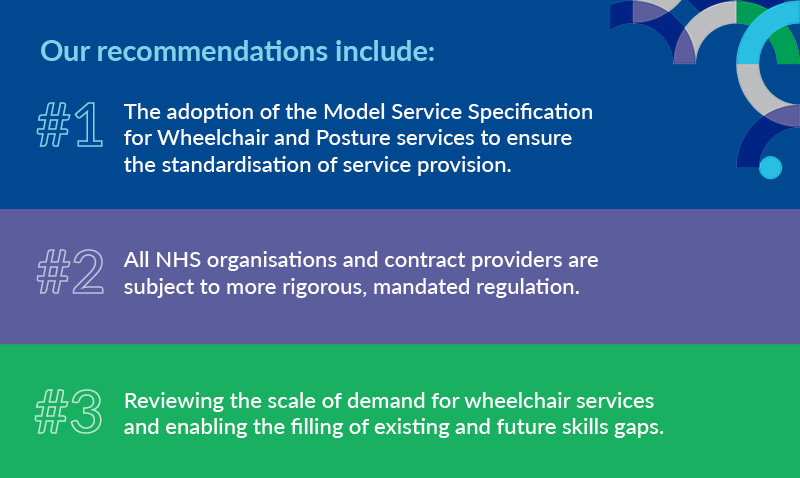Wheelchair Research Report 2022
Priorities and appropriate actions
Priorities and appropriate actions
The Wheelchair Alliance has partnered on the publication of a vital new report calling for more to be done to enhance the lives of wheelchair users, their families and carers.
‘An Economic Assessment of Wheelchair Provision in England’ is the first time independently verified research has been published revealing the experiences of wheelchair users. The findings make a series of recommendations on how more work, resources and investment are all required to meet the needs of this often under-represented section of society.
The report was undertaken by Frontier Economics and commissioned by the charity Motability in partnership with the Wheelchair Alliance.
The Alliance has considered the findings and agreed, in partnership with its Wheelchair User Engagement Group, the key priorities to be addressed. This position statement explains the priorities and appropriate actions.
To download a pdf of the full report, please choose from the options below:
The report indicates that Government funds spent on wheelchair users equates to an average of £125 per person per year, including the cost of a wheelchair, expert support as well as infrastructure costs. This level of underfunding has remained the same for at least five years. If the costs of energy, equipment and staffing are all rising, this figure needs urgent review for wheelchair support to be protected.
It is only by understanding the true demand for wheelchairs and providers that NHS England can commission appropriate services. Adequate funding requires accurate wheelchair user data so their families and carers can be confident that they will be treated equitably wherever they live in England. This means all types of wheelchair services must offer regular data based on outcomes to ensure accountability and reduce regional differences.

NHS England has worked in partnership to develop a service specification for wheelchair services. This is an effective guideline but as its non-compulsory, there are significant variations in structure and delivery between areas of England. This level of inequity must be addressed as the standardisation of provision is vital.
According to the report, wheelchair users are categorised into three levels of assessment/intervention criteria; low, medium and high. There is significant confusion over how these categories are interpreted, with some wheelchair users feeling there could be some discrimination. Ultimately, commissioners should be better educated about wheelchair users in their region and ensure individual needs are considered holistically.
In addition, providers currently interpret the specification to their local community or available budget and this sometimes leads to inconsistencies in provision. A more nuanced and tailored approach is required.
The Wheelchair Alliance will:
NHS England has worked hard to develop a reporting dataset for wheelchair services. However, this is often inconsistent meaning gaps in service provision are hidden. It is essential that the data includes outsourced providers to ensure that a full picture of service provision is available each quarter. The Wheelchair Alliance believes a more rigorous approach to standards is essential with the need for an independent regulator.
The report raises concerns that wheelchair users may be being exploited due to a lack of clear regulation, independent review body or information about who to approach regarding repairs, complaints or suggestions for service improvements.
The Wheelchair Alliance will:
It is impossible for NHS England and service commissioners to provide appropriate delivery funding without knowing the scale of demand. Unfortunately, this has been approximated for many years, and is an issue that should be urgently resolved.
When real demand is known, then appropriate funding can be identified for all aspects of wheelchair services ranging from the recruitment of skilled clinicians to the purchase of high-quality equipment. The report indicates significant uncertainty surrounding the number of wheelchair users in England. Understanding demand facilitates the robust planning of services where the appropriate number of highly skilled staff such as therapists, rehabilitation engineers and technicians can be forecast correctly.
The report highlights the importance of a highly skilled workforce. A community of practice to support the professional development of individuals and raise the profile of roles at education establishments is needed.
The Wheelchair Alliance will:
To download a pdf of the full report, please choose from the options below: